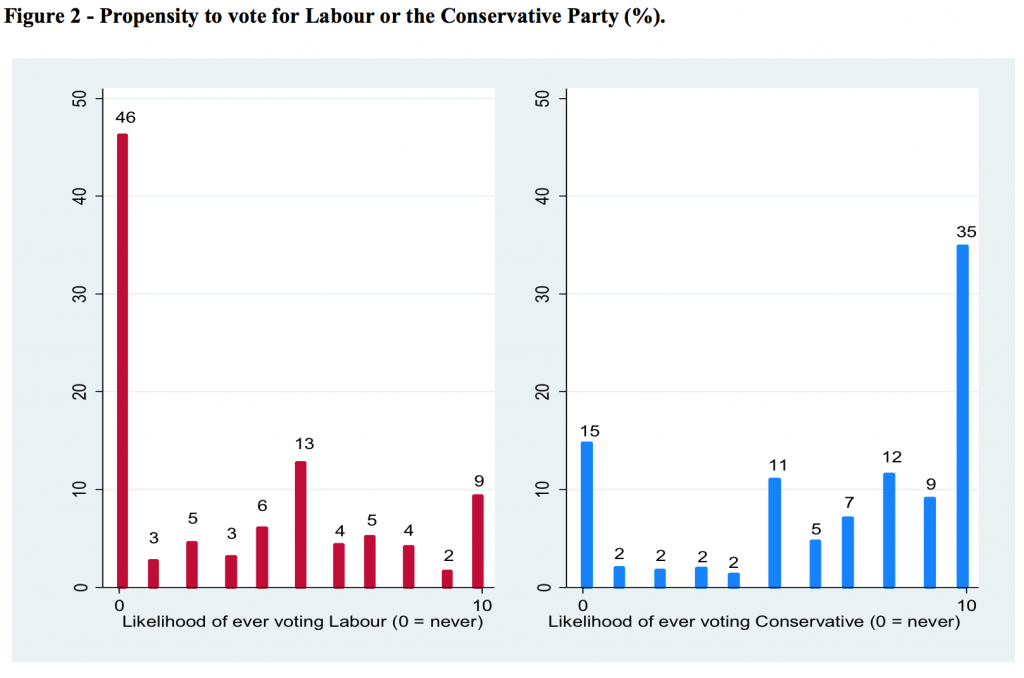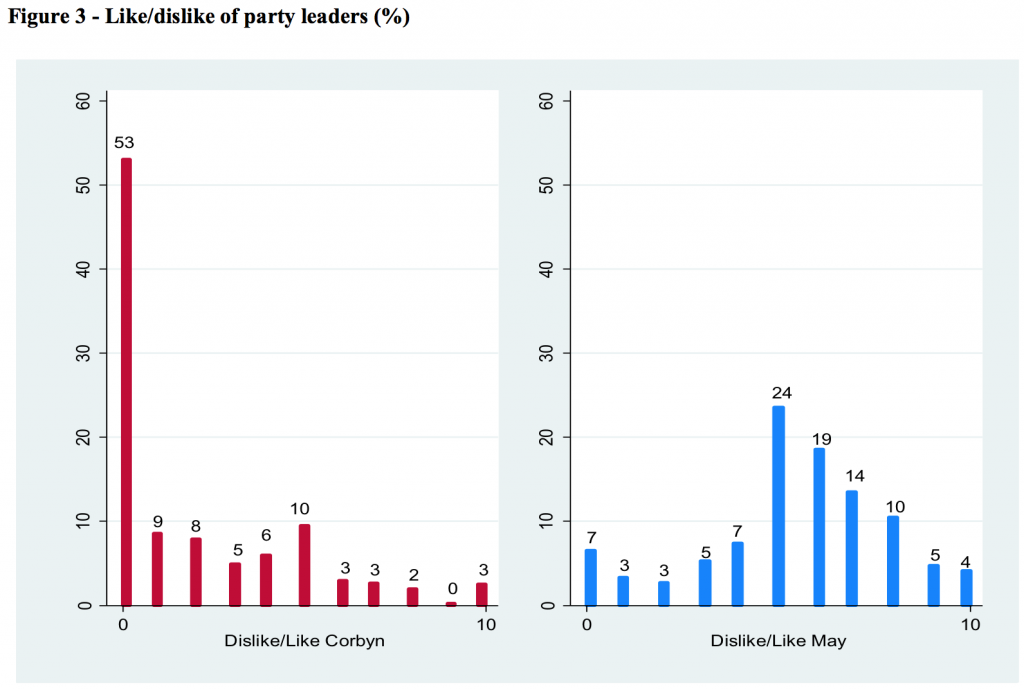 What are the views of British Jews towards Labour and its leader, given the party’s continuous association with antisemitism, particularly in recent years? Andrew Barclay finds that, rather unsurprisingly, there is now homogeneity of Conservative support within this group of voters, all at Labour’s cost.
What are the views of British Jews towards Labour and its leader, given the party’s continuous association with antisemitism, particularly in recent years? Andrew Barclay finds that, rather unsurprisingly, there is now homogeneity of Conservative support within this group of voters, all at Labour’s cost.
One of the more unexpected developments in British politics since 2015 has been the return of antisemitism as a prominent issue in public life. What has made this all the more surprising is how it has not been found in its traditional home of the fringes of the far right, but rather within the ranks of the UK’s premier left-of-centre party. Much has been said about the internal strife that has engulfed Labour and its leader, Jeremy Corbyn during this period. However, much less attention has been paid to the views of Britain’s Jews themselves. In particular, what can we say about the attitudes of Jewish voters towards the main parties, especially in light of the current crisis in Labour?
Robust historical research of the political attitudes of Jewish voters has been scarce. That being said, the most reliable academic evidence prior to Corbyn’s leadership shows that the partisan attachments of British Jews had been best characterised by their division in recent times, with party preferences at the 2010 General Election appearing evenly split and, if anything, leaning slightly more towards Labour than the wider electorate.
Events since, however, have meant that we need to reassess these relationships between Britain’s two main parties and its Jewish community. Even whilst acknowledging polls which suggest that the Tories had begun to open up a significant lead over Labour prior to 2015, analysis of the 2018 local elections in London has shown that wards with high Jewish populations have bucked the trend in the Capital by swinging substantially from Labour to the Conservatives. Moreover, the ongoing and public disputes surrounding Labour and anti-Jewish prejudice, coupled with how such disputes have become increasingly associated with Corbyn personally are demonstrative of the potential for any existing drift towards the Conservatives to be exacerbated and entrenched.
Using data from a nationally representative sample of British Jews, conducted in December of 2017 by Survation, we can see that significant levels of residual attachment to Labour are now a thing of the past, and that British Jews are currently exceptionally Conservative leaning in their party preferences.
Damage to the Labour Brand
A cursory glance at current levels of voting intention shows this clearly. Figure 1 shows that an overwhelming majority of UK Jews, almost three-quarters, now express a preference for the Conservatives. This represents a figure more than four times that of the Labour party, who attract the support of just 17% of the sample. Whilst accounting for the possibility that the roots of this degree of Conservative dominance precede the post-2015 crisis, it nevertheless represents a dramatically contrasting picture to our understanding of party attachments at the start of the decade.
 (Source: survey conducted by Survation in December 2017. Non-voters & Undecideds removed)
(Source: survey conducted by Survation in December 2017. Non-voters & Undecideds removed)
How can we account for such a contrast? Rather, is there anything that we can say further about the gulf that has emerged between the two parties; do these findings reflect a new reality in the attitudes of British Jews that Labour are now considered beyond the pale?
As a starting point, Figure 2 shows the probability that respondents would ever opt to vote for either of the main parties in a future election. Once again, the contrast is striking. Almost half of the sample report that they will never considering voting Labour in the future, with less than a quarter giving any positive indication that supporting Labour is likely. Assessments of the Conservatives on the other hand are broadly the mirror image, albeit not as pronounced as the outright rejection of Labour.
These results suggest a degree of polarisation that we would typically expect to see within a highly partisan section of the electorate. Perhaps we can now suggest that Jewish voters should also be included in this category, but then we also know that groups which express strong partisan commitments almost by definition tend to be fairly stable in their party preferences, at least over the short term. Moreover, for those examples that haven’t shown such stability, such as American Muslims post 9/11, volatility in party support has tended to be attributed to voters reacting against specific factors which radically alter previously held perceptions of parties. Given this context, the degree of rejection of Labour is remarkable precisely because we know that levels of support for the Party amongst Jewish voters have been healthy until recent elections.
 (Source: survey conducted by Survation in December 2017)
(Source: survey conducted by Survation in December 2017)
Leadership Assessments
Evidently, the Labour brand is currently held in poor esteem amongst Jewish voters. Even taking this into consideration, the personal association that Jeremy Corbyn has with the issue of antisemitism within the Party suggests that he may well be particularly off-putting. Below are two charts showing the (dis)approval of the main party leaders on a 0-10 scale.
Notwithstanding the issues with disentangling perceptions of leaders from their parties, the results remain damning for Jeremy Corbyn. Only a small fraction of respondents gave the Labour leader any positive score whatsoever, in contrast to over half the sample which score him at zero. It should also be pointed out that these results are hardly a ringing endorsement of Theresa May either. Assessments of her are broadly positive, but are nevertheless rather lukewarm despite the huge advantage that the Conservatives enjoy more generally. However, the negative assessments of Corbyn are so profoundly negative that if anything, the fairly mediocre perceptions of May serve only to further hint at attitudes being driven by a negative response to Labour, rather than particular ‘pull’ factors from the Conservatives.
 (Source: survey conducted by Survation in December 2017)
(Source: survey conducted by Survation in December 2017)
In one sense, these results ought not to be particularly surprising. When a party has become continually associated with being institutionally prejudiced towards a particular group, it is to be expected that there will be consequences in how the party is perceived by them. In this respect, there is absolutely no doubt that Labour under Jeremy Corbyn are perceived to be antisemitic amongst a large majority of British Jews. Despite this, the homogeneity of Conservative support within a group with such recent history of political division is a finding worth emphasising.
Indeed, it is also worth stating that, as with any social group, the politics of Anglo-Jewry are multifaceted and diverse, and it is not the intention to neglect this when stressing current levels of political homogeneity. Rather, such homogeneity serves only to demonstrate the extent to which British Jews currently feel ostracised from a party that so many were once strongly associated with, and exemplifies the scale of the difficulty that Labour face in any attempt to win back the trust of Jewish voters.
_____________
 Andrew Barclay is a Doctoral Researcher in Politics at the University of Manchester.
Andrew Barclay is a Doctoral Researcher in Politics at the University of Manchester.
All articles posted on this blog give the views of the author(s), and not the position of LSE British Politics and Policy, nor of the London School of Economics and Political Science.







I wonder what the picture would be like in Scotland for comparison.
Antisemitism “has not been found in its traditional home of the fringes of the far right”. That’s incorrect: http://www.jpr.org.uk/documents/JPR.2017.Antisemitism_in_contemporary_Great_Britain.pdf